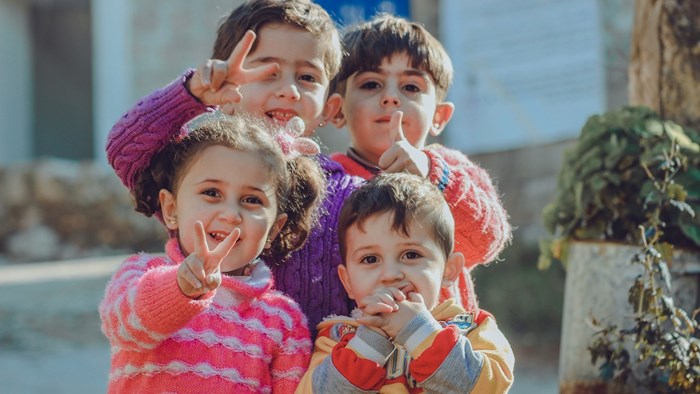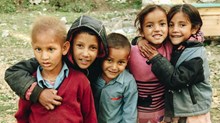5 Lessons Humanitarian Leaders Can Learn from Improv

When you hear the word “improv” you may think of the iconic TV show Whose Line is it Anyway? or the episode of The Office in which Michael Scott decides to take improv classes. Simply put, improv is a form of theater that is unplanned and unscripted. Scenes are entirely made up on the spot.
Many credit Viola Spolin as the Mother of Improv. She was a social worker, performer, and educator who developed theater games in the mid-20th century while working with children and immigrant families at the Hull House in Chicago. These games helped students both learn and connect with one another despite language barriers. According to Spolin, “Theater Games are a process applicable to any field, discipline, or subject matter which creates a place where full participation, communication, and transformation can take place.” Her work also inspired the core principle of improv (“Yes, and”), which encourages both acceptance and collaboration.
Improv and refugee ministry may seem like two different worlds, but there’s more overlap than you might think. My eyes were opened to the struggles, needs, and resilience of refugees while working on my master’s in Humanitarian and Disaster Leadership at Wheaton College. I now have the privilege of working for a nonprofit in Chicagoland that mobilizes the Christian community to welcome and befriend refugees. In my role, I facilitate opportunities for volunteers to extend welcome and walk alongside newly arrived refugee families. I also love comedy, and have recently started taking improv classes and performing. Here are five lessons I’ve learned from improv that I think can be helpful for humanitarian leaders.
Yes, and connect first.
Improv teaches improvisers to value relationship above the task. If two performers come on stage and only talk about the muffins they are baking, it’s going to be a boring scene. The audience doesn’t care about the muffins! What they really want to know is how these characters feel, especially about each other. Is one character sad because her daughter is about to go off to college, and she will miss spending time with her? Or is the other character fearful because she will have to navigate adulthood without her mom nearby? If the scene doesn’t focus on the relationship, it isn’t going very far. In order to connect well in the scene, improvisers must be attuned to one another.
Humanitarian work can be fast-paced and there is always more work to be done. It’s easy to get hyper-focused on a project and forget to connect with the people we’re serving, with our team, or even with ourselves. Improv has encouraged me to practice prioritizing connection, which fosters trust and strengthens relationships. I recently visited a refugee woman experiencing loneliness. I invited her to join our programming, but she shared that she was not ready. I recognized that during that time she simply needed me to sit and listen to how she is doing, offer a hug, and bear witness to her tears.
Yes, and lead with vulnerability.
Improv is extremely vulnerable. Improvisers step onto a stage without a script and create something completely new with their scene partners. They may say something that surprises themself or their scene partner. They may even say something they regret. However, the show must go on. I once watched an improviser forget his own character’s name. As he kept moving through the scene, he kept changing his name, each time leaving the audience laughing even harder. He acknowledged his “mistake” and turned it into comedic gold. Improvisers also learn how to depend on one another, which requires great vulnerability. If someone is struggling to know what to say or do, they will look to their teammates for support or to lead the scene.
Due to the ever-changing nature of humanitarian work, humanitarians sometimes feel like they are walking in uncharted territory, without a script or roadmap. As humanitarian leaders, there is freedom in admitting we don’t have all the answers. We are going to make mistakes. We’re going to need to ask for help at times. Improv has encouraged me to practice self-compassion, accept and reframe failure, embrace tension, and foster interdependence; all which require vulnerability. I recently visited a newly-arrived Congolese family who doesn’t speak any English, and I was struggling to find a way to connect. So I decided to start dancing to the music they had on their TV. They began laughing, and a few family members started dancing with me. Improv also teaches us to take risks. According to author and speaker Brene Brown, “You’re going to know failure if you’re brave with your life.”
Yes, and be willing to pivot.
Improv provides improvisers with countless opportunities to practice being adaptable. An improviser can come onto a stage and start pretending to restock shelves at the grocery store. However, if their scene partner interprets their actions as packing their spaceship for a trip to Mars, they are going to need to pivot quickly.
Humanitarian contexts, almost by definition, change quickly. A policy change, war, natural disaster, or new crisis can lead an organization to completely switch directions. For example, in 2021, groups working with refugees and immigrants shifted their focus, energy and resources to serving the 80,000 Afghan individuals who were evacuated to the U.S. The COVID-19 pandemic also caused many organizations to pivot. As needs of the refugee communities changed, such as job loss and rising food insecurity, our organization quickly switched directions to fill in the gaps. Improv has helped me to strengthen the muscle of pivoting, and to practice leaning into change with greater ease.
Yes, and actively listen.
Improv requires active listening. This means offering one’s full attention, listening to understand, and letting go of judgment. A true improv skit is created on the spot. Therefore, everything shared by a performer is important for understanding who the characters are, what’s at stake, and where the scene is going. Performers must actively listen to their scene partners so they can fully respond in an authentic way. There’s no room for judgment in improv (including self judgment), because everything a performer offers is valuable to the scene.
Active listening can help humanitarians to serve better, both with their teams and with all stakeholders. It’s important to lead with humility, which means taking a posture of listening and learning. Responding to what you hear and learn with curiosity instead of judgment can help foster an environment where others feel safe to freely share their ideas and opinions. Active listening can also lead to greater collaboration, because everyone has something valuable to contribute. Just as it is important for performers to listen intently to each teammate on stage, it’s equally important for humanitarians to listen well to each stakeholder, especially beneficiaries. For example, when I’m meeting with a newly-arrived refugee family, I don’t want to assume that I know what they want or need. Improv reminds me to intentionally listen to those I’m working with in order to affirm the dignity, experiences, and opinions of those around me. Active listening also reminds me that people are the experts of their own needs.
Yes, and be playful.
One perk of improv is that it can be super fun! It’s an opportunity to pause from various responsibilities and commitments and make space for creativity, play, and self care. Jeff Ash, director of Westside Improv in Wheaton, IL, says, “Play unlocks the creative spirit that we all have. When people lose a creative spirit and get engulfed in whatever they’re doing in their day to day lives, I believe it impacts our ability to connect, build relationships, and be in community.”
Humanitarian leaders should have outlets for play that are unrelated to their job. Yes, adults need to play too, especially when their job involves heavy responsibilities, such as serving vulnerable populations. Compassion fatigue is a reality for those in the humanitarian field. As psychotherapist and author Francoise Mathieu says in The Compassion Fatigue Workbook, “Compassion fatigue is an occupational hazard, which means that almost every helper who cares about their patients/clients will eventually develop a certain amount of it, in varying degrees of severity.” For me, one way to manage this hazard has been through improv, where I’ve found a safe, life-giving space, dedicated to laughter, connection, creativity, and personal growth. It’s important for humanitarians to discover their own unique outlets for play and community, whether it’s improv, playing board games with friends, or taking a dance class, because as comedian Amy Poehler says, “No one looks stupid when they’re having fun.”
These are five connections I’ve made as a humanitarian worker who has recently discovered the world of improv. When I spoke with Jeff Ash, who both performs and teaches improv, I appreciated how he made similar connections between improv and humanitarian work: “We take care of each other, we support each other, we promote each other, we see each other, hear each other, connect with each other. Just the practice of becoming better improvisers, I’ve got to think, yields a better human being. Someone who has empathy, who cares, who connects. Someone who can elevate another person’s need above their own. The ultimate goal as improvisers is to do all those things for each other on stage. It’s a fun, playful way to practice... [and] become better at this in life.”
Whether or not you decide to take an improv class, there are great lessons we can glean from the art form. Ultimately, when we prioritize connection, lead with vulnerability, are willing to pivot, listen to understand, and make time for play, we will better collaborate with and care for and those around us.
Katie Fuhs received her M.A. in Humanitarian and Disaster Leadership at Wheaton College and currently works for a nonprofit in Chicagoland that mobilizes the Christian community to welcome and befriend refugees. She is passionate about biblical justice, advocacy, and comedy.
The Better Samaritan is a part of CT's
Blog Forum. Support the work of CT.
Subscribe and get one year free.
The views of the blogger do not necessarily reflect those of Christianity Today.






















